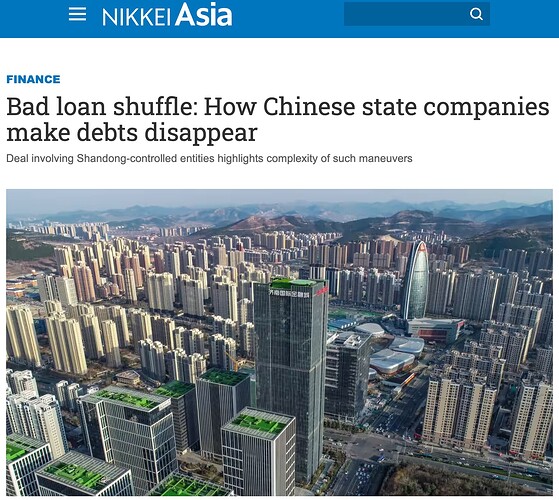-
中国山东国际信托公司(SDITC)董事长报告称,管理的资产同比增长25%,税前利润激增27%,达到5.9123亿元(8600万美元)。
-
山东国际信托公司通过与另一个地方政府控制的实体进行复杂的交易,得以抵消处置不良资产所产生的25亿元人民币的损失。
-
这样的操作在中国很常见,也掩盖了中国金融系统中坏账堆积的程度。
-
两家持有不良贷款的信托公司被国投公司出售给山东金融资产管理公司(SFAM),这是一家省级资产管理公司。SDITC和SFAM的母公司都是山东鲁信投资控股集团,而鲁信投资控股集团又由山东省政府控制。第一个信托公司瑞源61号的贷款本金加利息共计54.9亿元,第二个信托公司瑞源76号的本金和利息共计25.8亿元。
-
国资委是唯一对这两个信托表示兴趣的单位,出售的25亿元损失几乎被一项相关交易完美抵消了。国投公司以26.7亿元的价格将其持有的富国基金管理公司16.675%的股权全部卖给了国投证券。在这些交易之后,国投公司在2月份完成的交易中,将其持有的SFAM的全部1.36%的股份卖给了其母公司Lucion。
-
惠誉评级公司的Sherry Zhao表示,让地方资产管理公司参与解决地方房地产问题可能会增加其信用状况的脆弱性,并可能加速地方AMC的信用质量两极分化。市场分析师、《红色资本主义》一书的作者之一弗雷泽-豪伊说,这种交易是另一个 "踢皮球 "的例子,由于缺乏问责制和透明度,“很多问题都没有问”。他补充说,随着中国经济增长的减速,中国吸收此类活动的能力越来越小。
-
The chairman of China’s Shandong International Trust (SDITC) reported a 25% year-on-year increase in assets under management and a 27% surge in pretax profit to 591.23 million yuan ($86 million).
-
SDITC was able to offset a 2.5 billion yuan loss incurred from the disposal of nonperforming assets through complicated transactions with another local government-controlled entity.
-
Such maneuvering is common across China and serves to obscure the extent to which bad debt is piling up in the country’s financial system.
-
Two trusts holding nonperforming loans were sold to Shandong Financial Asset Management (SFAM), a provincial-level asset management company, by SDITC. Both SDITC and SFAM have the same parent, Shandong Lucion Investment Holdings Group, which is in turn controlled by the Shandong provincial government. The first trust, Ruiyuan 61, had loan principal plus interest totaling 5.49 billion yuan, and the second trust, Ruiyuan 76, had principal and interest totaling 2.58 billion yuan.
-
SFAM was the only entity to express interest in either trust, and the 2.5 billion yuan loss on the sale was almost perfectly canceled out by a related transaction. SDITC sold its entire 16.675% stake in Fullgoal Fund Management to SFAM for 2.67 billion yuan. Following these transactions, SDITC sold its entire 1.36% stake in SFAM to their parent, Lucion, in a deal completed in February.
-
Sherry Zhao of Fitch Ratings said that involving local asset management companies in resolving local property issues could increase their credit profile vulnerability and could accelerate the polarization of credit quality of local AMCs. Fraser Howie, market analyst and co-author of “Red Capitalism,” said that such transactions are another example of “kicking the can down the road,” and due to a lack of accountability and transparency, “many questions aren’t asked.” He added that China has less and less capacity to absorb such activity as growth decelerates in the country.
